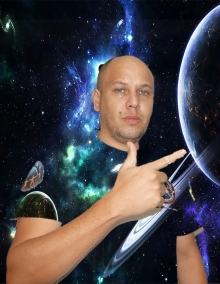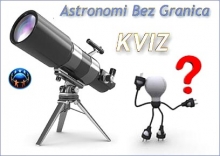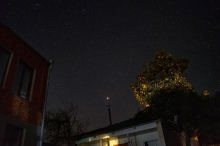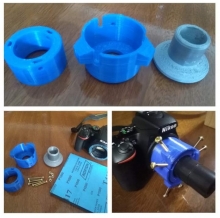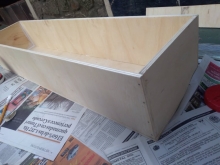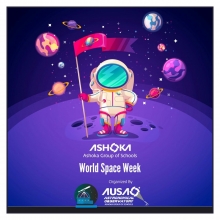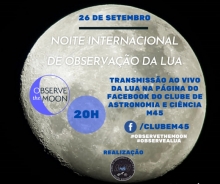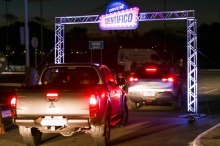Kevin Govender
Working at the International Astronomical Union’s (IAU) Office of Astronomy for Development (OAD) since its inception in 2011 has certainly been quite a ride. The GAM blog has been an interesting annual reflection of the “astro4dev” journey. In 2012 my contribution to the GAM blog was on “Astronomy for a Better World” where I wrote about the very big picture of how we can use astronomy to make the world a better place. In 2013 I was less visionary and more practical in terms of what we were doing and how you could be a part of it. In 2014 I wrote about some of the lessons we had been learning along the path towards Astronomy for Development. This year I’m reflecting on the future with a focus on how we intend to make an impact in the long term.
GAM2015 comes at yet another exciting time in the life of the OAD - just after a major independent review of our activities (which went very well I should add); at the halfway point in the 2010-2020 decade (for which the IAU Strategic Plan was designed); and as we welcome new skills to the astro4dev family in the form of Eli Grant (who has already helped the OAD to shape an exciting new framework that we are in the process of building for all our projects – something we’re calling the “OAD Impact Cycle”).
Through the OAD’s annual open call for proposals we’ve supported 68 projects worldwide, involving over 40 countries (there’s a cool interactive map on our home page). That sounds and looks quite nice but the question that constantly rings in my head is “how do we know we’re making an impact?” Even more so, how do we know that in the long term, we will be able to say that we’ve achieved the objective of “astronomy for a better world”? Each year our call for proposals is oversubscribed with many great ideas and some really awesome people behind them. The reality though is that often these great ideas or project proposals do not build on previous great ideas, not necessarily through any fault of the project leaders, but simply because there’s no structure to support such an approach of “building on the shoulders of others” – this is where the OAD needs to play a role and also something that will be important for each project idea to be nurtured towards large scale impact.
Since the very inception of the OAD we have grappled with this issue of how to achieve some sort of recording and dissemination of “best practice” or “lessons” from projects such that there’s constant momentum in a positive direction without reinvention slowing down efforts – yes, as harsh as that word may sound, reinvention is a reality that needs to be addressed. We need to achieve a state where someone comes up with an idea and then can quickly access other people’s ideas from around the world to refine and optimize their own. They should be able to readily access relevant resources that may have been developed for a similar programme or activity in some other part of the world. They should be able to access research related to their project in an efficient, time-saving, user-friendly manner such that they can apply evidence-based techniques and methods to their own projects. Importantly, besides maximizing on the positive outcomes of a project, one should be able to minimize on the unintended negative outcomes, which may have been learned through another person’s experiences.
Throughout the life of the OAD we’ve played with different ideas for capturing this spirit of a positive feedback loop for projects – from using the OAD website as an interactive platform for project leaders to the idea of an astro4dev journal of best practice. None of the ideas took root until this most recent one which we refer to as the OAD Impact Cycle. The thing is, we had never really engaged sufficiently with the community of people who specialize in so called “intervention evaluation.” Evaluation of projects is critical if we want to build on lessons from previous projects. In December 2013 the OAD released a Monitoring and Evaluation Framework to support funded projects in evaluating their outcomes. This was developed in partnership with the University of Cape Town’s Institute for Monitoring and Evaluation. Now, our newest team member, Eli Grant, brings a wealth of experience from this field and will be a key person in implementing this “positive feedback” aspect of the OAD’s project dimension.
The OAD Impact Cycle is simply a high-level view of the process of how astro4dev projects will build on each other’s lessons and contribute to a library of best practice and resources. This library will eventually feed a global knowledge base (which includes knowledge from other fields apart from astronomy) and thus contribute to large scale delivery. The basic schematic of the principle of this Impact Cycle is illustrated in the diagram below:
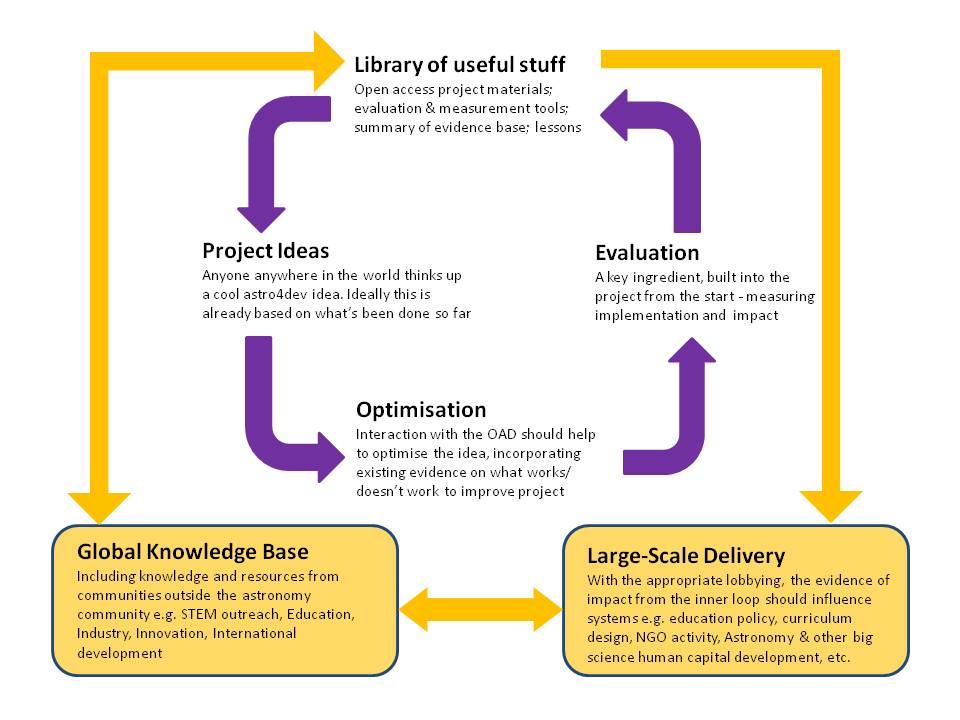
The hope is that when we reach the point of large scale delivery (on the bottom right of the schematic) we can really start talking about a significant “impact” of astronomy on development.
Although the schematic appears quite basic and logical, it’s the nuts-and-bolts of this Impact Cycle which comprises the real hard work. We need to establish processes that will facilitate the smooth implementation of this cycle – processes that do not overwhelm or discourage someone with a potentially world-changing idea. We need to bring in researchers from the evaluation fields and development expertise. We need to interrogate every aspect of this cycle thoroughly and look at how it may influence our current way of working, which may include a rethink of how we coordinate the annual call for proposals - perhaps we need to have a two phased call for example, with letters of intent being the first port of call. We also need to be aware of, and possibly try to address, any existing cultures within the global science, education and outreach communities, which perhaps may not readily support such an approach.
As we shape this roadmap towards “impact” (and we remain, as always, open to hearing your thoughts and engaging with you during such shaping) we maintain, as our guiding beacon, the exciting big picture: that ultimately this whole idea is meant to empower individuals and help take your good astro4dev ideas from a doodle on your desktop to the point of global rollout!
***
 Kevin Govender began work at the OAD on 1st March 2011 as its first Director. He has extensive experience using astronomy for development, acquired during his previous position as the Manager of the Southern African Large Telescope Collateral Benefits Programme at the South African Astronomical Observatory (Cape Town and Sutherland sites). During that time he chaired the Developing Astronomy Globally Cornerstone Project in 2009 and served on the IAU Executive Committee Working Group for the International Year of Astronomy 2009. He was also part of the development of the IAU Strategic Plan since 2008, mainly due to his activities in developing astronomy across Africa. Prior to his work in astronomy-for-development activities, he held the position of Fast Neutron Scientist at the South African Nuclear Energy Corporation (Necsa). During his time at Necsa he was also closely involved with promoting physics at school level through the South African Institute of Physics and Necsa, serving also on the South African national steering committee for the International Year of Physics 2005. Kevin currently serves on numerous committees including the Academy of Science of South Africa’s STEM Committee; Quest magazine’s Editorial Board; and Scifest Africa’s Advisory Committee.
Kevin Govender began work at the OAD on 1st March 2011 as its first Director. He has extensive experience using astronomy for development, acquired during his previous position as the Manager of the Southern African Large Telescope Collateral Benefits Programme at the South African Astronomical Observatory (Cape Town and Sutherland sites). During that time he chaired the Developing Astronomy Globally Cornerstone Project in 2009 and served on the IAU Executive Committee Working Group for the International Year of Astronomy 2009. He was also part of the development of the IAU Strategic Plan since 2008, mainly due to his activities in developing astronomy across Africa. Prior to his work in astronomy-for-development activities, he held the position of Fast Neutron Scientist at the South African Nuclear Energy Corporation (Necsa). During his time at Necsa he was also closely involved with promoting physics at school level through the South African Institute of Physics and Necsa, serving also on the South African national steering committee for the International Year of Physics 2005. Kevin currently serves on numerous committees including the Academy of Science of South Africa’s STEM Committee; Quest magazine’s Editorial Board; and Scifest Africa’s Advisory Committee.








